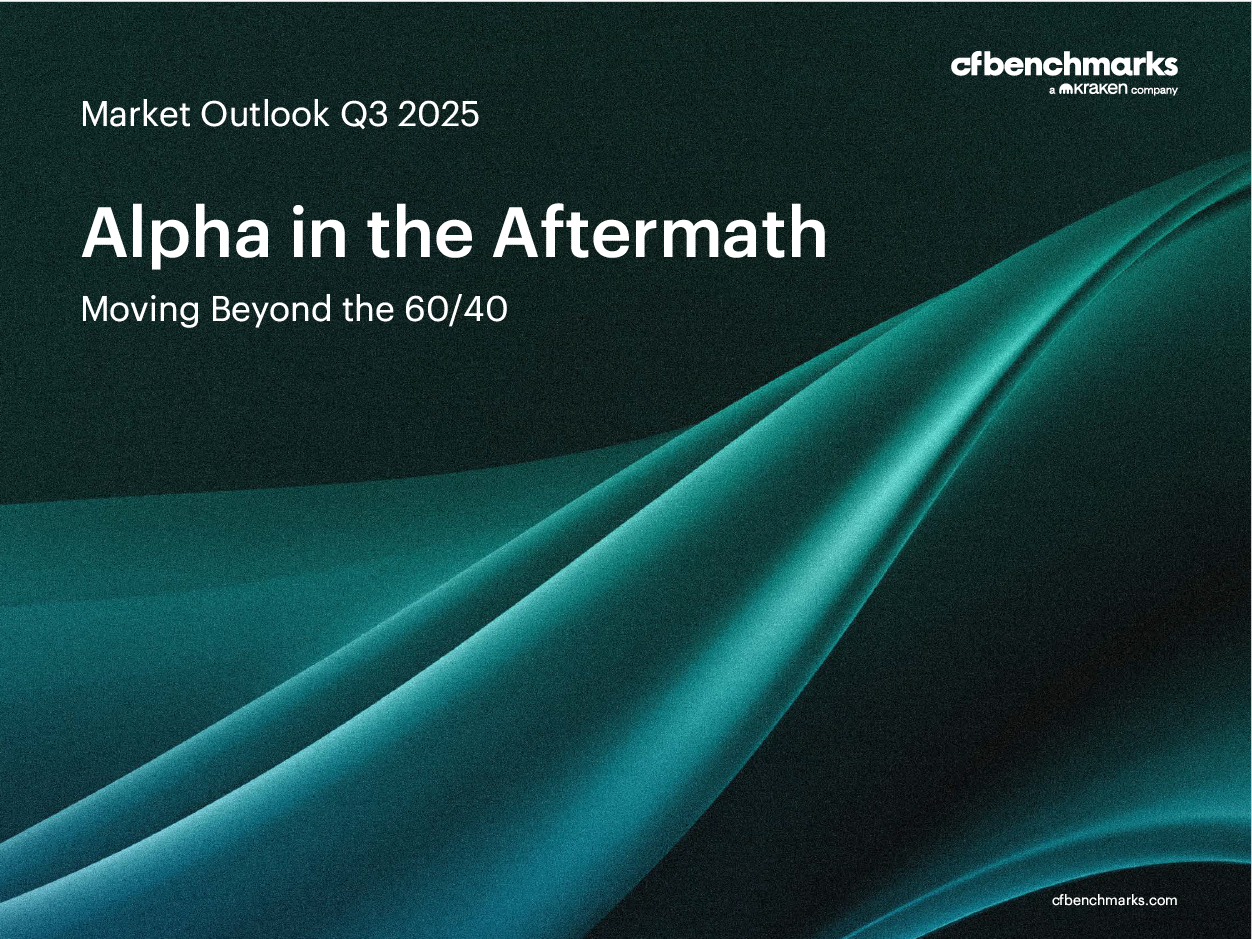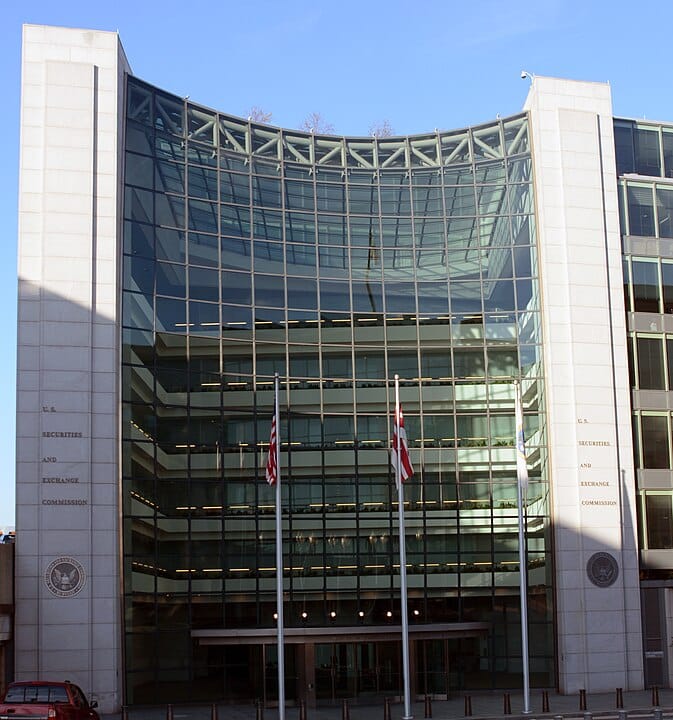CF Benchmarks Newsletter Issue 86
The REX-Osprey Solana + Staking ETF (ticker: SSK) won double first-mover status as the first U.S.-listed spot Solana ETF, as well as the first U.S. ETF that enables investors to earn staking rewards.

- How REX-Osprey scored first US Solana staking ETF
- CF Benchmarks rolls out CF Factor Intelligence datasets
- SEC approves multi-asset crypto ETFs ... then presses 'pause'
Clarity
The resumption of constructive market sentiment as participants look past geopolitical turmoil and economic uncertainty, much of it wrought by increasingly unpredictable U.S. policy, peaked as U.S. lawmakers headed into a ‘crypto week’ of debates and voting on closely watched legislation.
CLARITY, GENIUS done
The Senate’s GENIUS Act, aimed at establishing “a regulatory framework for payment stablecoins” has today been signed into law.
GENIUS Act readings coincided with hopes for a clearer digital asset regulatory regime, which is the aim of the Digital Asset Market Clarity (CLARITY) Act. That passed with a 294-134 vote this week.
An airing was also scheduled for an anti-Central Bank Digital Currencies (CBDCs) law, in the shape of Senate Commerce Committee Chair Ted Cruz’s Anti-CBDC Surveillance State Act.
The passage of all three through the House, regardless of how material that ends up being in the near term, has underpinned prices, with Bitcoin headlining, continuing more than a year of range expansion.
CME Bitcoin Futures, of which the CME CF Bitcoin Reference Rate (BRR) has settled in excess of a notional $1 trillion since their inception, printed their newest peak at $123,615 on Monday July 14th.
The CF Benchmarks Research team’s Q3 Outlook Report is a must-read for any investment professional. Dive into it now by clicking below.



REX-Osprey's SOL staking ETF takes flight
Also noted by the CF Benchmarks research team in their outlook report:
“The SEC is likely to introduce uniform listing standards for spot crypto ETFs, including multi-token baskets, accelerating approvals and widening market access.”
This spotlights the immediate focus of crypto product issuers, with a number of specific elements making significant progress in recent weeks.
Most consequential, and earlier than expected: the approval of the first U.S. ETF investing in a crypto asset beyond Bitcoin and Ether – with staking rewards included, to boot.
The REX-Osprey Solana + Staking ETF (ticker: SSK) won double first-mover status as the first U.S.-listed spot Solana ETF, as well as the first U.S. ETF that enables investors to earn staking rewards.
As is often the case, CF Benchmarks played an integral part in this latest inflection point. The REX-Osprey Solana + Staking ETF’s Solana reference price is our regulated CME CF Solana-Dollar Reference Rate (SOLUSD_RR).
In principle, staking is straightforward to understand. In reality though, it is only tenuously related to anything that exists in traditional finance.
Little wonder why the task of enabling pathways for crypto staking within listed market assets has proved to be challenging for securities regulators.
Gradually though, many have done just that. For instance, recently in Canada.


Now, the SEC has overseen the introduction of staking into U.S. markets.
Perhaps not quite under the circumstances the Commission envisaged. Nevertheless, REX/Osprey justifiably take a well-deserved 'W' for getting the first Solana ETF done - and in healthy volumes too.
The Solana ETF $SSK took in $12m on first day, according to Osprey who told Decrypt (we won't see it in data till tonight). That's pretty solid. For context, it took 3mo for $SOLZ to get $12m. Also pre-market volume is $3m (vs 260k for SOLZ), pointing another healthy trading day. https://t.co/ORottKyGXg
— Eric Balchunas (@EricBalchunas) July 3, 2025
CME Solana Futures reflect a positive crypto market reaction. The contracts, which are cash-settled to CF Benchmarks' regulated SOLUSD_RR index, have risen by around 44% off their June 23rd low; partly reflecting the successful emergence of staking ETFs in two key North American markets.
Click below to read key details about the REX-Osprey Solana + Staking ETF (SSK) in our launch post.

More CF Benchmarks news
- Hong Kong’s emerging regulated crypto product market has also notably continued to evolve in recent months, culminating in this week’s launch of the newest HK Bitcoin ETF, by Pando Finance, the Pando Bitcoin ETF (2818.HK). Click the link below to go to the full launch post.

- After CF Benchmarks unveiled the first comprehensive Factor Model for Digital Assets last year, we’re excited to announce the introduction of CF Factor Intelligence – the roll-out of access to the data sets based on our proprietary model. Click below to get across the only factor-based investing framework published by a regulated Benchmark Administrator.

- If you’ve not taken a peek at the CF Benchmarks Research team’s Q3 Outlook report yet, again, click here for the full report.

SEC approves crypto portfolio ETF... then presses pause
Despite increasing regulatory clarity, there are signs of potential internal conflict at the SEC
'40 Act vs. '30 Act
The circumstances surrounding REX-Osprey’s ETF approval do not detract from the achievement, but as we hinted at earlier, the regulatory basis of the Solana staking fund is worth noting.
As a ’40-Act fund (structured and granted approval according to the 1940 Investment Company Act), it stands out relative to almost all spot-based crypto ETFs, which are overwhelmingly 1933 Securities Act funds – i.e., commodity or grantor trust-type entities.
Stipulations of the ‘40 Act, mean that while SSK, is spot-based, as a registered investment company, certain standards related to diversification, liquidity and concentration risk, explicitly apply. As of July 10th, SSK holdings were roughly 56% spot SOL, 43% in an EU listed spot SOL ETP, and about 4.3% cash and equivalents.
The SEC has made its preference for the '33 Act framework for physically-backed commodity-like ETFs, including crypto ETFs, clear, making SSK something of a regulatory outlier.
'No further comments'
In order to keep to ’40 Act review protocols (chiefly, no 19b-4 exchange rule change is required), once the SEC informed the issuer (REX-Osprey) it had “no further comments”, at the end of June, the fund was legally effective.
As such, SSK’s path to approval spotlights how the two different fund structures (’40 Act and ’33 Act) create distinct procedural obligations that could become increasingly relevant – presenting an optical and potential policy headache for the SEC going forward.
All other live Solana ETF filings (some with staking included) have been tabled as ’33 Act funds, and it may be that SSK has inadvertently gained something of a temporary moat, as the one unique vehicle whose issuer had the chutzpah to take the more challenging option.
Grayscale's portfolio ETF paused
Meanwhile, challenges the Commission is navigating as it makes the transition to a new phase of regulatory oversight are emerging in other ways too.
The puzzling outturn surrounding the SEC’s approval of Grayscale’s application to convert the Digital Large Cap Fund (GDLC) into an ETF is one example.
On July 1st, the SEC’s Division of Trading and Markets approved Grayscale’s application to convert GDLC into a multi-asset spot crypto ETF, including BTC, ETH, SOL, ADA, and XRP.
(Coindesk write-up here; approval order here.)
It's the first green light for a full-blown diversified crypto portfolio in the U.S., in theory paving the way for the approval of several other multi-asset crypto applications piling up at the SEC.
Bitwise applied to uplist Bitwise 10 Crypto Index Fund (BITW) way back in November 2024, setting in motion what’s likely to be a significant market debut, partly because BITW was the first widely available U.S. crypto portfolio, having been launched in 2017.
More recently, Krane Shares filed for the Krane Shares CF Large Cap Crypto Index ETF, that will track CF Benchmarks’ regulated CF Large Cap (Diversified Weight) - US - Settlement Price.
The lengthening list of managers filing for diversified crypto ETFs spotlights why they're seen as one of the most significant frontiers for institutional adoption.
"Discretionary Review"
Within 24 hours of NYSE Arca's rule change on behalf of Grayscale being approved though, it emerged the Commission had simultaneously published a ‘Rule of Practice’ order permitting it to “affirm, reverse, modify, set aside or remand for further proceedings”, any staff decision. A surprise for many, the procedure is in fact, explicitly denoted as a “Discretionary review”. (Letter from the SEC’s Office of the Secretary.)
It’s reportedly a ‘temporary’ stay on the launch of Grayscale's approved ETF, and is said to be an unusual, if not an entirely unheard of, twist.
Bloomberg’s James Seyffart suggested two possible reasons for the pause:
It can be found here on the SEC website. We have a few theories as to why this happened.
— James Seyffart (@JSeyff) July 2, 2025
1. The SEC doesn't want to let anything to launch under the 19b-4 process until they officially approve or come up with some framework for digital assets in the ETF wrapper. pic.twitter.com/WegC5d2Tcj
The inclusion of XRP and Cardano in the portfolio, neither of which have been approved separately for offering within the ETF wrapper, might also be a factor.
Division
Seyffart’s “2nd theory”, the suggestion that possibly, “another division isn't ready to let this convert just yet”, echoes another recent instance of possible internal SEC divergence, that became external.
An apparently well-informed and comprehensive Division of Corporation Finance statement on staking was issued at the end May. The key conclusion was promising for issuers:
It is the Division’s view that “Protocol Staking Activities” (as defined below) in connection with Protocol Staking do not involve the offer and sale of securities within the meaning of Section 2(a)(1) of the Securities Act of 1933 (the “Securities Act”) or Section 3(a)(10) of the Securities Exchange Act of 1934 (the “Exchange Act”).[10] Accordingly, it is the Division’s view that participants in Protocol Staking Activities do not need to register with the Commission transactions under the Securities Act.
From ‘Statement on Certain Protocol Staking Activities’, published by the SEC on May 29th, 2025
Unfortunately, it was followed a short while later by a contradictory statement by Commissioner Caroline Crenshaw, containing such comments as:
“The staff’s analysis may reflect what some wish the law to be, but it does not square with the court decisions on staking and the longstanding Howey precedent on which they are based.”
From a Statement by SEC Commissioner Caroline Crenshaw, May 29, 2025
Even if the pause on the listing of Grayscale’s multi-asset ETF doesn’t end up throwing a spanner in the works of mainstreaming, for any length of time, again, optics suggesting potential internal conflict are problematic.
Most importantly, the risk is these kinks could lengthen the timeline for a range of closely watched regulatory refinements to be completed.
CFB Talks Digital Assets Episode 46: Evolve's Elliot Johnson on the second wave of North American crypto ETFs
The recent debut of Evolve's XRP ETF (XRP), and Evolve Solana ETF (SOLA), show the firm remains at the cutting edge.
Forward-thinking investment management has been key, and that's been consistently supplied by Evolve's CIO, Elliot Johnson.
Join us to hear how Elliot navigates the unique opportunities and challenges of managing listed crypto investments in Canada.
Just a few of many conversation highlights...
- How professionals can bridge the gap in investors' understanding of staking ETFs
- How Evolve operationalizes staking in Evolve Solana ETF
- Elliot's crystal-clear breakdown of how XRP fixes the costly and inefficient cross-border payments system
- Why Evolve Cryptocurrencies ETF (ETC) serves as an alternative rail for first-time digital asset investors
Listen in now, and learn for tomorrow!
Listen on Spotify
Listen on Apple Podcasts
Watch on YouTube
The information contained within is for educational and informational purposes ONLY. It is not intended nor should it be considered an invitation or inducement to buy or sell any of the underlying instruments cited including but not limited to cryptoassets, financial instruments or any instruments that reference any index provided by CF Benchmarks Ltd. This communication is not intended to persuade or incite you to buy or sell security or securities noted within. Any commentary provided is the opinion of the author and should not be considered a personalised recommendation. Please contact your financial adviser or professional before making an investment decision.






